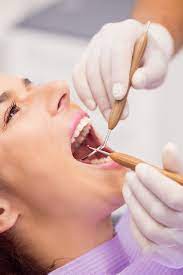Cosmetic Dental Clinic - GUM RECESSION Treatment Vizag
Gingival or gum recession is a prevalent oral health problem in which the gums around teeth gradually recede, revealing more tooth or root structure. Failure to address this phenomenon can have serious repercussions, as it can cause various dental problems. Learn all about gum recession—what it is, how it happens, what treatments are available, and how to avoid it—in this detailed guide to good dental health.
Cosmetic Dental Clinic
What is the Gum Recession?
A condition known as gum recession happens when the protective layer of gum tissue around teeth gradually recedes or wears away, revealing the tooth's root. It makes accumulating bacteria easier because it can create spaces between the gums and teeth. Consequently, gum recession can cause teeth to become sensitive, more prone to cavities, and even lose their teeth in extreme circumstances.
Laser Teeth Whitening in Visakhapatnam
Gum recession symptoms-
Tooth Sensitivity:
An increase in tooth sensitivity is a common sign of gum recession. The tooth's root becomes more exposed when the gums recede, increasing its sensitivity to foods and variations in temperature.
Extra-Long Teeth:
When gums recede, you may notice that your teeth appear longer than usual and that more of the teeth are showing than normal. When comparing the lengths of neighbouring teeth, this might be obvious.
Distinct Gum Shapes:
You can tell gum recession is happening if you see little dents or notches along your gumline. Separating the gums from the teeth is a common cause of these depressions.
Injured Gums:
Although it is not always the case, bleeding gums—particularly when brushing or flossing—can indicate gum disease, including recession.
Shifts in the Position of Teeth:
Teeth might move or become misaligned if gums recede. Alterations to your bite and general oral health may result from this.
Gum Recession Causes-
Several things can cause gum recession, and the likelihood of it happening increases when these causes are combined. Among the most typical reasons are:
Bad dental hygiene:
Harmful or ineffective dental hygiene methods can exacerbate gum recession, including:
- Vigorous brushing.
- The use of a toothbrush with harsh bristles.
- The absence of regular flossing.
Dental Conditions:
Untreated inflammatory gum diseases, including gingivitis and periodontitis, can erode tooth enamel and gum tissue, known as gum recession.
Genetics:
A hereditary component of recession may make certain people more likely to have thinner or more sensitive gum tissues.
Teeth Grinding: Bruxism
Over time, recession can occur due to the constant stress that teeth grinding or clenching impose on the gums and teeth.
Cigarette Use:
Recession is more likely to occur in those who smoke or use other tobacco products because they impede the body's natural healing processes.
Misshapen Teeth or Bite:
When teeth aren't properly aligned or if you bite incorrectly, it can put uneven pressure on your gums, leading to gum recession.
Changes in Hormones:
Gum recession is more likely to happen after hormonal changes such as those that occur during menopause, pregnancy, or adolescence.
Treatments for Gum Recession -
Root Planing and Scaling:
This meticulous cleaning procedure removes tartar and plaque from the teeth and roots, which promotes gum reattachment and prevents recession.
Gum Transplant Procedure:
A gum graft might be required if gum recession has progressed too far. Attaching tissue from another part of the mouth or a donor source to the damaged area and covering the exposed roots is how this is accomplished.
PST: Pinhole Surgery
In PST, tiny holes are made in the gum tissue and then repositioned to hide the exposed roots. It's a minimally invasive technique. Compared to more conventional gum graft procedures, this one usually requires less healing time.
Treatment for Orthodontics:
By realigning the teeth or fixing bite problems, orthodontic therapy can reduce gum recession by shifting the pressures acting on the gums.
Good oral hygiene:
Maintaining appropriate dental hygiene is essential to avoid or treat gum recession. Following your dentist's instructions for proper oral hygiene involves brushing, flossing, and using an antiseptic mouthwash regularly.
Lifestyle changes:
One way to stop gum recession is to quit smoking and treat tooth grinding (bruxism) using a mouthguard.
Gum Recession Prevention -
See Your Dentist Frequently:
For early detection and treatment of gum recession, it is vital to have regular dental checkups and cleanings.
Gentle Dental Care:
To keep your gums healthy, use a toothbrush with soft bristles and be careful when brushing and flossing.
Healthy Eating:
Gum tissue and general oral health are supported by a mineral- and vitamin-rich, well-balanced diet, emphasising calcium and vitamin C.
Don't Smoke:
In addition to improving overall health, quitting smoking and other tobacco products helps keep gums healthy.
Relieve Stress:
One risk factor for gum recession is tooth grinding, also known as bruxism, and stress might play a role in this condition. You can lessen this likelihood by learning appropriate stress management skills.
Deal with Hormones:
See your dentist regularly to check your gum health, especially during significant hormonal changes like menopause, pregnancy, and puberty.
Conclusion:
When gum recession goes unchecked, it can devastate oral health. It's a frequent dental problem. If we want to intervene and avoid problems early on, we need to know what they are, what causes them, and what treatments are available. People can protect their gums and keep their teeth in the best possible condition all their lives if they follow good oral hygiene habits, visit us at the Dental Studio Vizag, and deal with any underlying causes. Seek the advice of our dentist for specific instructions and a customised treatment plan if you think you may be suffering from gum recession or any associated symptoms.




